26. January 2024
Playing the trombone to find and save freedom
At the end of January 2024, our trombonist, Bruce Collings, will retire from the ensemble.
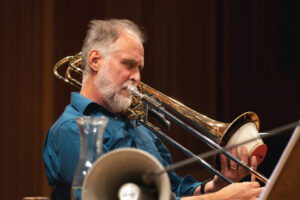
After appearing regularly with us as a guest, Bruce became a member in the 1995/1996 concert season. In some of his first projects, he wasn’t hired to play the trombone but to step in on the euphonium. Two remarkable pieces are worth noting: a complex work by James Dillon and a brass quintet by Hans Werner Henze. Both parts were extreme in register, virtuosity, microtonality, determination, and perseverance. A perfect match for the ensemble!
Throughout his career, Bruce combined his position in the ensemble with his job in the Bergische Symphoniker Orchestra. The orchestra demanded his mastery of classical skills,encompassing the orchestral sound, articulation, and interpretation of the well-known repertoire. Ensemble Musikfabrik asked the opposite: something new and different for every piece. Juggling both positions required Bruce to travel between Solingen and Cologne, often to do a morning rehearsal with the orchestra and an afternoon rehearsal with the ensemble, only to turn around and return for the orchestra concert in the evening.
Finding this wide range of skills, combined with flexibility and good stamina in one person, is unique and made him one of the most outstanding trombone players around, culminating in invitations from other leading New Music ensembles in Europe.
It is impossible to mention all the projects in which Bruce played a significant role. Still, it is important to highlight a few:
DRY–TSAYN
The tour and CD production of Karlheinz Stockhausen’s MOMENTE in 1998 was conducted by Rupert Huber, with the famous composer himself as sound engineer. Bruce’s contact with Stockhausen sparked an interest in his repertoire that remained and grew, coming to fruition in the staged productions of MICHAELS REISE (2008) and SONNTAG AUS LICHT (2011).
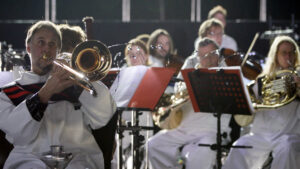
Throughout his opera cycle LICHT, Stockhausen gives the trombone a significant solo role as the protagonist Lucifer, which requires the memorization of choreography and complex musical parts.
Bruce invested a lot in developing this role. His sound, energy, and interpretation gave Lucifer a new voice. These performances have been documented on CD and video and are now a valuable example for future generations of trombonists.
An essential feature of the Lucifer character is his obsession with counting the numbers up to thirteen. Bruce’s American accent gave the German number a unique and unforgettable sound.
FORTY–THREE
The project DELUSION OF THE FURY, a music theater piece by composer Harry Partch, offered a whole new package of challenges for the ensemble, not in the least for Bruce.
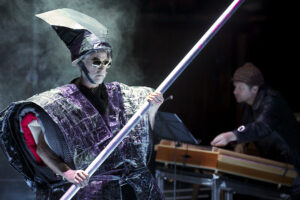
Director Heiner Goebbels placed Bruce in key roles in both mysterious stories: As the ghost of an old warrior in the Noh drama and as the blind judge in the African folktale. Both roles reveal uncomfortable truths.
In Delusion of the Fury, the composer required the musicians to sing and act, which is an exciting but tricky challenge. The director managed to cast the musicians of the Musikfabrik in roles based not on acting skills but on the character traits available within the ensemble. The way we know Bruce as a colleague, his roles seemed a perfect match!
PROMETHEUS
We remember another role: the moving scene in the production KUNST MUSS (ZU WEIT GEHEN) or DER ENGEL SCHWIEG. The composer Helmut Oehring placed Bruce on a high platform. In his famous trademark full lotus yoga posture, he faced a young boy and told how the trombone became an essential part of his life.
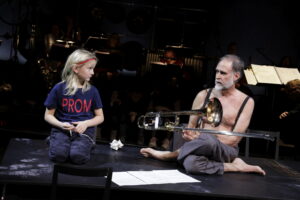
The boy reflects on his words, referring to Prometheus, “Prometheus – the one who thinks ahead – didn’t bring fire from heaven just so that the sausage roasters could do business; He brought it so the earth would burn. He was one cunning son of a Titan. When the breaking of taboos has become chic and grand in the hands of the sausage roasters, a thing in which the bourgeoisie finds more and more pleasure and earns more and more money, then art must recede; oh no, not to return fire to heaven, but cunning as all forward-thinkers are, to seek and find a way to save what is free, orderly, inconsolable. In other words, all that is poetic about love, possibly by taking a detour via chastity to protect it from the tattered freedoms.”
With a shrewd philosophical comment of a young boy, the composer puts Bruce on the spot and reveals the real intent behind his playing: to seek, find, and save freedom! During the monologue, Bruce illustrates the words with Mahler’s iconic trombone solo from the Third Symphony.
The trombone becomes a sacred instrument.
It can put the world on fire!
The Old Testament refers to the sound of trombone-like shofars that break down the walls of Jericho.
Or shall we think a little more down to earth?
The trombone becomes a vehicle to move through the world, settle in Germany, and feed a family. A megaphone for self-expression to create crazy sounds that cause friction, full of the heat that we associate with fire.
Our ears burn.
HERMES
Remember his start in the ensemble? As a virtuoso euphonium player?
Since then, he has continuously worked on widening his horizons and maintaining and developing skills. Bruce’s fire kept him practicing – always trying to make his playing more precise, more accurate, never giving up when his part seemed impossible to play – practicing before, during and after rehearsals!
The trombone is often perceived as a slow-moving instrument with its endless slide of seven positions. Yet it becomes an agile and fast-moving voice in Bruces’s hands.
It was as if he wore Hermes’ winged shoes when he was given a chance to solo over the music of Frank Zappa – now on our CD “Frank Zappa, Bad Doberan & Elsewhere.”
This intensity can also be heard in how he speaks about the trombone.
His words, loaded with information, flow nonstop and at high speed.
The problem is…
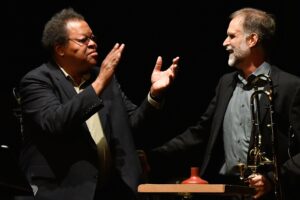
Sometimes, overwhelmed by the copious possibilities proffered by Bruce on his trom- bone, young composers’ ears would turn red and their eyes big, often leaving the room stupefied and in awe. Many established composers have gratefully used all these rich sources to create a repertoire with new sounds on the trombone. Liza Lim, Georg Friedrich Haas, George Lewis, Enno Poppe and Rebecca Saunders, to name a few big names, wrote significant parts for Bruce.
And if you, dear reader, are a trombone player dealing with issues that seem impossible to solve, ask Bruce! It will be a unique chance to meet someone with so much fire to solve problems or find ways to get it done.
Bruce will start discussing and practicing until that passage is smooth and working, until the impossible becomes possible, with you receiving a friendly laugh and many tips and ideas.
HEPHAESTUS
I cannot end this brief homage to my colleague without mentioning mutes. Indeed, most readers of this brochure might be unaware of these objects that brass players insert into the bell to change the color of the sound. Usually, the mutes are made of aluminum and have weird but exciting shapes. It takes a lot of skill, or even acro- batics, to insert or take them out while playing in the flow of the music (where com- posers often forget to allow enough time…).
Bruce has developed great skills to manage this, and on the rare occasions when he didn’t make it, the mutes sounded great when they hit the floor.
The shape of a mute can remind us of a flowervase, as one colleague from the ensemble noted when he got bored during the previously mentioned Momente production. In the middle of a recording session, he filled Bruce’s mute with almost two liters of water, a prank that Bruce professionally managed to hide from the entire crew.
We are not 100% sure, but we estimate that Bruce’s curiosity for sound colors has led him to gather Germany’s largest trombone mute collection. We are never surprised to see at least five mutes next to his chair, although the composer only asks for one, each to serve just a handful or even only one note. No effort is spared to make the best out of what the trombone part has to offer.
ZEUS
Bruce’s career at Ensemble Musikfabrik comes to an end, and we all cry.
We have traveled a lot, spent countless hours at tables of numerous restaurants, shared stories, shared lifetimes, and shared our passion for sounds and music (not always the same). Good times and bad times, lazy times and hard times, challenging music and easy music, masterpieces and works we have long forgotten.
We have shared countless magic moments of breaking a silence – completely synchronized in time, tuning, and dynamic – without any noticeable signal when to start, just synchronicity by breathing together. You can only do this with someone you have worked with for many years.
We will miss that!
Bruce was a member for 28 years.
What happened to time?
It takes a new orientation and bravery to move forward.
For inspiration, we can look to our philosophers and thinkers. Philosophy can help us process all these events, so I gathered some famous quotes from our Elders to help us accept the current situation.
“I think it’s really tragic when people get serious about stuff. It’s such an absurdity to take anything really seriously… I make an honest attempt not to take anything seriously: I worked that attitude out about the time I was eighteen, I mean, what does it all mean when you get right down to it, what’s the story here? Being alive is so weird.”
— Frank Zappa
“Nothing endures but change.”
— Heraclitus
“Time does not change us. It just unfolds us.”
— Max Frisch
“Time flies like an arrow; fruit flies like a banana.”
— Anthony G. Oettinger
“How did it get so late so soon?”
— Dr. Seuss
“The more sand has escaped from the hourglass of our life, the clearer we should see through it.”
— Niccolò Machiavelli
„Ich habe Zeit, um ihn reinzustecken, aber nicht um ihn rauszunehmen.“
— Bruce Collings
Dear Bruce:
Thank you for your sound, music, motivation, fascination and passion! They will always be part of Ensemble Musikfabrik’s epic story.
Marco Blaauw
Dear Bruce:
Thank you for your sound, music, motivation, fascination and passion! They will always be part of Ensemble Musikfabrik’s epic story.
— Marco Blaauw
Dear Bruce:
Thank you for your sound, music, motivation, fascination and passion! They will always be part of Ensemble Musikfabrik’s epic story.
— Marco Blaauw
